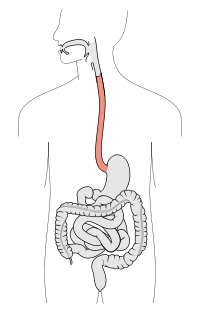
Photo from wikipedia
The study aimed to assess concerns of caregivers of children with EA-TEF related to feeding–swallowing difficulties, compare the concerns according to type of atresia and repair time, and investigate its… Click to show full abstract
The study aimed to assess concerns of caregivers of children with EA-TEF related to feeding–swallowing difficulties, compare the concerns according to type of atresia and repair time, and investigate its relationship with time to start oral feeding. Caregivers accompanying 64 children with EA-TEF were included. Age, sex, type of atresia, repair time, and time to start oral feeding were noted. Parents completed the Turkish version of the Feeding/Swallowing Impact Survey (T-FS-IS) to assess the concerns of caregivers related to feeding–swallowing difficulties. The T-FS-IS has three subscales including daily activities, worry, and feeding difficulties. The median age of patients was 3 (min = 1, max = 12) years, of which 57.8% were male. 43.8% of cases were isolated-EA, and 56.3% were EA-distal TEF. 57.8% of cases received early repair, and 42.2% had delayed repair. The median time to start oral feeding was 4 weeks (min = 1, max = 128). The mean scores of daily activities, worry, feeding difficulties, and total score from the T-FS-IS were 2.43 ± 1.18, 2.73 ± 1.28, 2.10 ± 0.97, and 2.44 ± 1.09, respectively. Caregivers of children with isolated-EA reported more problems in total score and all subscales of the T-FS-IS than EA-distal TEF ( p < 0.01). Caregivers of children who received delayed repair reported more problems in total score and all subscales of the T-FS-IS than children with early repair ( p < 0.05). Moderate to strong correlations were found between the T-FS-IS and time to start oral feeding ( p < 0.01, r = 0.55–0.65). This study suggests that caregivers of children with isolated-EA and/or delayed repair and/or delay in oral intake may have higher concerns related to feeding–swallowing difficulties.
Journal Title: Dysphagia
Year Published: 2019
Link to full text (if available)
Share on Social Media: Sign Up to like & get
recommendations!